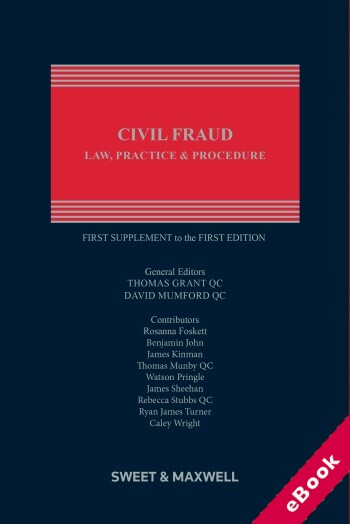Civil Fraud: Law, Practice and Procedure: 1st Supplement (eBook)
ISBN13: 9780414088337
Published: May 2022
Publisher: Sweet & Maxwell Ltd
Country of Publication: UK
Format: eBook
(ProView)
Price: £89.00
The amount of VAT charged may change depending on your location of use.
The sale of some eBooks are restricted to certain countries. To alert you to such restrictions, please select the country of the billing address of your credit or debit card you wish to use for payment.
Sale allowed in
Anguilla, Antigua and Barbuda, Aruba, Austria, Bahamas, Barbados, Belgium, Bermuda, Bulgaria, Cayman Islands, Croatia, Cuba, Cyprus, Czech Republic, Denmark, Dominica, Dominican Republic, Finland, France, Germany, Gibraltar, Greece, Grenada, Guadeloupe, Guernsey, Guyana, Haiti, Hungary, Ireland, Italy, Jamaica, Jersey, Latvia, Liechtenstein, Lithuania, Luxembourg, Malta, Martinique, Montserrat, Netherlands, Poland, Portugal, Puerto Rico, Romania, Saint Kitts and Nevis, Saint Lucia, Saint Vincent and the Grenadines, Slovakia, Slovenia, Spain, Sweden, Trinidad and Tobago, Turks and Caicos Islands, United Kingdom, Virgin Islands (British), Virgin Islands (U.S.)
Sorry, due to territorial restrictions applied by the publisher we are unable to supply this eBook to United States.
Civil Fraud: Law, Practice and Procedure is designed to be the primary port of call for all practitioners conducting a civil fraud case. It deals with the subject in a comprehensive manner, combining in-depth legal analysis with a practical approach. The authors focus throughout on the real-life situations which litigants in this area regularly encounter and offer effective guidance on the complex practical and procedural issues which can arise.
The First Supplement brings the book up to date with the addition of new case law and legislation.
The book starts with an examination of common factual and legal scenarios in a fraud case, which can be difficult to navigate even for the most experienced litigators. The remainder of the text develops the legal, practical and procedural issues flowing from such scenarios.
The authors, drawing on a wealth of experience in litigating fraud claims, bring together the disparate areas of the law that fall under the label “fraud”, from the substantive causes of action – common law, restitutionary and equitable claims and claims arising under statute – through to remedies. The book provides a full and comprehensible treatment of the myriad procedural swords and shields which can be used in fraud litigation, including freezing orders, proprietary and other injunctions, search orders, receivership, ancillary orders and the increasingly-used contempt jurisdiction. It also considers the key international aspects of civil fraud litigation. This is a primary ‘single source’ point of reference which avoids the need to navigate a whole series of texts in a field where practitioners often work under considerable time pressure.
Civil Fraud: Law, Practice and Procedure works as a road map to take the practitioner from the moment of initial instructions through to a completed legal and practical analysis, whether at the various interlocutory stages, or at trial. The book covers the types of claim that arise when a party has been the victim of fraudulent conduct:
- Presents a combination of an in-depth analysis of the relevant law, drawing on a wide variety of different causes of action and focused on the issues and problems which litigants encounter in practice
- A practical guide to those procedural steps parties can take and the practical challenges they face
- Gives full guidance on the competing legal principles and the potential future direction of the law
- Advises on how best to approach common fraud factual scenarios
- Investigates difficult or developing areas of law, such as in relation to proprietary claims or the principle of piercing the corporate veil
- Offers guidance relevant to their case, whether this is in terms of the way in which a fraud case should be presented legally or how applications for early interim remedies should best be made or resisted
- Guides the busy practitioner to help them translate the fact pattern with which they are presented in their instructions into the correct legal framework
- Maps fact patterns commonly encountered into causes of action that might be pleaded and relief that might be sought in respect thereof and a mechanism which gives the reader a road map from factual instructions to completed legal analysis
- Draws together the disparate areas of the law that “fraud” covers - encompassing breach of contract, tort, equitable claims and restitution, not to mention the international and procedural aspects with which the practitioner has to be familiar
- Covers international litigation look at the practical mechanics of enforcing a civil fraud claim overseas - the gathering of evidence from overseas, overseas witnesses and enforcement of judgments overseas
